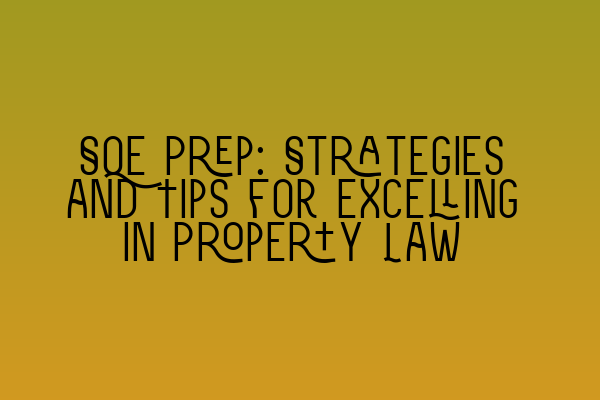SQE Prep: Strategies and Tips for Excelling in Property Law
Property law is a fundamental area of law that every aspiring solicitor must master. Whether you are preparing for the Solicitors Qualifying Exam (SQE) or studying property law as part of your legal education, it’s crucial to develop effective strategies and techniques to excel in this subject. In this blog post, we will discuss some valuable strategies and tips to help you succeed in property law.
Understand the Key Concepts
First and foremost, it’s essential to have a solid understanding of the key concepts in property law. Familiarize yourself with important terms such as freehold, leasehold, easement, covenants, and title deeds. Knowing the definitions and implications of these concepts will form the foundation of your understanding in property law.
Related Articles:
Focus on Case Law
Studying and analyzing property law case law is a crucial aspect of preparation. Many key principles and rules in property law have been established through landmark cases. By immersing yourself in relevant case studies, you will develop a deeper understanding of how the law is interpreted and applied in property disputes.
When studying case law, pay close attention to the facts, issues, and judgments rendered by the courts. Analyze the reasoning behind the court’s decisions and consider how those judgments may apply to similar factual scenarios.
Keep Up with Legislation
Property law is subject to constant legislative changes. It’s crucial to stay updated with new legislation, amendments, and statutory instruments that impact property law. Regularly review and understand the impact of these updates as they can significantly affect the rights and obligations of property owners, tenants, and other stakeholders.
Make use of reliable legal resources such as legislation databases, legal journals, and law society publications to stay informed about recent changes in property law.
Develop Analytical Skills
Analytical skills are vital in property law as they enable you to identify issues, evaluate arguments, and develop sound legal reasoning. Enhance your analytical abilities by practicing legal analysis exercises, engaging in group discussions, and participating in hypothetical problem-solving scenarios.
It’s also beneficial to engage in mock exams and quizzes to assess your progress and identify any areas where you need further improvement. SQE 1 Practice Mocks FLK1 FLK2 and SQE 1 Practice Exam Questions can provide valuable practice to enhance your analytical skills.
Improve Time Management
Time management is crucial when preparing for property law exams. Allocate sufficient time to each topic and ensure you have a well-structured study plan. Break down complex topics into smaller, manageable tasks and create a study timetable to keep yourself on track.
Consider enrolling in SQE 1 Preparation Courses and SQE 2 Preparation Courses to further enhance your time management skills and receive expert guidance throughout your preparation journey.
Practice, Practice, Practice
Practice is key to excelling in property law. Engage in regular revision exercises, solve practice questions, and attempt past exam papers to familiarize yourself with the structure and format of property law exams.
Working through practice questions and exams will help you develop speed, accuracy, and confidence in answering property law scenarios. This will also enable you to identify any gaps in your knowledge and address them promptly.
Stay Updated with Exam Dates
Finally, ensure that you are aware of SRA SQE Exam Dates and registration deadlines. Being well-informed about exam dates will allow you to plan your preparation effectively and avoid any last-minute rush.
By implementing these strategies and tips, you can enhance your understanding of property law and improve your chances of excelling in property law exams. Remember to stay focused, maintain a disciplined study routine, and seek professional guidance when needed.
